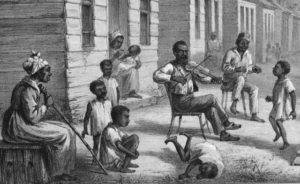By AnnaLiza Carey and Karlie Eugene

My partner and I researched Negro Spirituals and the important milestones in Black history that shaped musical expression. Spirituals were used as an oral tradition to speak about hardships while infusing Christian values. Negro spirituals were traditionally characterized as monophonic or “unison” songs, but today have grown to be best known as harmonized choral arrangements. The historical roots of negro spirituals speak volumes to the spirit of the people who used these songs to move through hardships with determination and hope such as slavery and oppression, with a sense of self that extended beyond the physical realm and into the spiritual. Across various continents in Africa, there was a cultural connection of music at the center of people’s lives as a means to celebrate, worship, and communicate through dynamics like “call-and-response”. Negro spirituals are also distinct as a genre for the “microtonally flatted notes, syncopation, and counter-rhythms marked by hand clapping”.
While researching Negro Spirituals we found that our perception of gospel music connected to negro spirituals as a close relative to the genre; and we wanted to investigate the relationship between the two genres of one existed at all. In our readings, we found that although the two genres share similarities, they’re differences are significant. One of the most interesting differences we found was the idea that the manner in which slaves spoke about God is different. Negro spirituals speak more to the pain and exhaustion of the hardships of life through asking God for guidance and grace. With gospel music, it draws on some of the structures of negro spirituals but it speaks with more love and affection towards God rather than solely expressing the toils of the human experience.

